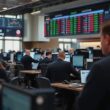The German stock market benchmark, the DAX, experienced a further decline on Friday, extending losses from a weaker start to the trading day. By midday, the index was calculated at approximately 23,685 points, representing a drop of 1.6 percent compared to the previous day’s closing level.
Shares of Daimler Truck, Sartorius and Siemens Energy were among the most significantly impacted by the downturn. Countering this trend, Bayer led the list of gainers, boosted by upward revisions to its full-year revenue and earnings forecasts driven by strong performance in the pharmaceuticals sector.
Market analyst Andreas Lipkow attributed the downward pressure on stocks to the announcement of additional tariffs, specifically targeting Switzerland, prompting investors to reduce positions ahead of the weekend. “Many investors are taking partial profits prompted by the announcement of further tariffs, for example, against Switzerland” Lipkow stated. “It appears another escalation is brewing.
He further explained that recent trading weeks have consistently demonstrated how weekend periods often bring unexpected developments and shifts related to international trade. “Market participants have learned from that” Lipkow added, referring to the fragile truce between the EU and the United States in their ongoing trade disputes. “This current accord can quickly be broken again.
Lipkow also highlighted the prevalence of geopolitical tensions globally, suggesting potential consequences for the global economy are difficult to predict. “There is currently too much arson occurring at too many geopolitical hotspots, making the potential impact of a widespread conflagration on the global economy almost impossible to assess”. This has led investors to prioritize selling off holdings in cyclical industries while increasingly focusing on defensive stocks, like those of Bayer, Eon and banks.
The Euro also weakened slightly on Friday afternoon, trading at $1.1408, with the dollar fetching €0.8766.





